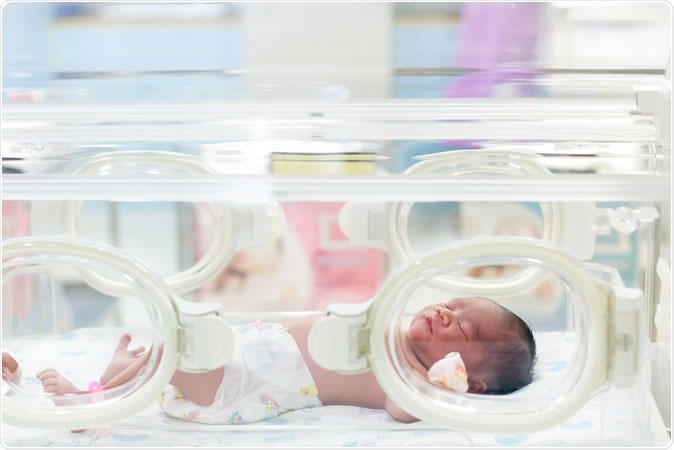Infertility affects about 12.5% of couples worldwide. In about 1 of 3 couple, the male partner is infertile, while in another third, the woman has a fertility issue. In the remaining cases, the cause is unknown or problems with both male and female partners are present.

Image Credit: My Life Graphic / Shutterstock
Small for gestational age
A baby is small for gestational age (SGA) when born with a birth weight that is in the lowest 10% for that term of pregnancy, according to a chart that records the weight by week of gestation of all babies in the sample chosen. As an example, consider a baby born at full term, which is taken to be 40 weeks of pregnancy. The range of birth weights is between 2,500 g and 4,500 g in the sample used for the current study. If a full-term baby is born who weighs less than 3,000 g, the birth weight is defined as being in the lowest 10% of that category and the baby would be termed small for gestational age.
SGA and malformation risk
Prior research has shown that baby boys who fail to show normal growth in the womb are at a 2- to 3-fold risk of having problems with the testes and penis. The most common defects include hypospadias, a condition where the penis is malformed such that the urinary tube, or urethra, opens not at the tip of the penis but lower down at the back; cryptorchidism, where the testes fail to descend from the abdomen to their normal scrotal position; and testicular cancer. All three conditions have been shown to increase the risk of infertility. On the other hand, there is not much to show how birth weight for the term of pregnancy is related to infertility.
The study
The researchers examined the birth and other medical records of almost 5,600 men and 5,300 women who were born between 1984 and 1987, until the end of 2017. All participants had been singleton births born in either Aalborg or Odense, two Danish regions, with a mean age of 32 years at the end of 2017 Their birth records provided information on the term of pregnancy at which they were born and their birth weights. The data on infertility and fertility treatments came from the Danish National Patient Registry and the Danish In Vitro Fertilization registry.
In addition, the researchers used a form that had been filled out by the mothers of all participants during pregnancy, asking about their age, smoking, drinking and other lifestyle factors, health and body mass index, social and demographic factors such as cohabitation and employment status.
The findings
Analysis of the risk of infertility found that it was 55% higher for a man who had been born small for gestational age compared to those who were at normal weight for the term of pregnancy when they were born. The same was not true of women, however.
In real-life terms, the risk was 8.3% for the first group but 5.7% for the second group.
Infertility was determined if either a single member or a couple was diagnosed as infertile, or as seeking treatment for fertility. This meant that some of the latter participants could have been lesbian or single mothers who wanted to conceive.
To correct this, the researchers separately analyzed participants who had full information on the cause for seeking infertility treatment. in this group, the risk of infertility was 85% higher than with AGA men. This could indicate that the true risk among SGA men is much higher than calculated using more inclusive but potentially inaccurate infertility criteria.
The current study thus confirmed the earlier work, showing that the main factors causing an increased risk of infertility comprised hypospadias and cryptorchidism. Once these factors were removed from consideration, the association between SGA and infertility reduced to a non-significant 37% increase. That is, about 7.3% of men born SGA were infertile compared to 5.6% of those who were born appropriate for gestational age (AGA).
The findings are strengthened by the large number of participants and the high rate (87%) of pregnancy-related information supplied by the mothers of the participants under the Health Habits for Two study. The completeness of the Danish medical registries also allowed 98% of the participants to be followed up, making this a highly representative sample and reducing the risk of bias.
However, there is a possible problem in that 32 years is like the prime of male reproductive life. The researchers would like to follow up the group to see what happens after another decade. Moreover, gestational age was decided in various ways according to the healthcare providers involved, and might not have been accurately determined in all cases.
Implications
Explaining this, researcher Anne Thorsted says, “This may indicate that part of the association between gestational weight and infertility is mediated by the effects of hypospadias and cryptorchidism, which is known to be related to later risk of infertility.” However, she pointed out that the underlying mechanism for this association is still unknown.
She thinks it could be possible that the presence of an environment which doesn’t properly promote growth in the womb is by itself a deterrent to appropriate growth of the sperm and reproductive system. On the other hand, if the SGA is due to problems with the mother’s health or lifestyle, such as smoking, this could explain why all three problems often occur together – cryptorchidism, hypospadias and infertility. Thorsted comments, “Our results show that sometimes we must look at the very early life to find explanations of health problems that occur later in life.”
Journal reference:
A Thorsted, J Lauridsen, B Høyer, L Arendt, B Bech, G Toft, K Hougaard, J Olsen, J P Bonde, C Ramlau-Hansen, Birth weight for gestational age and the risk of infertility: a Danish cohort study, Human Reproduction, , dez232, https://doi.org/10.1093/humrep/dez232